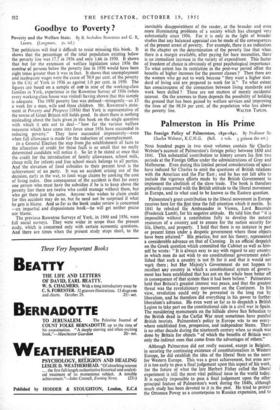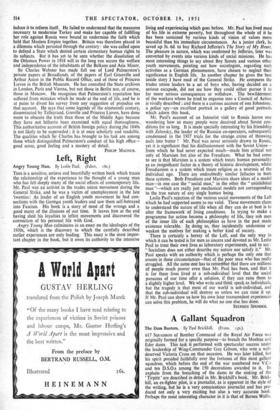Palmerston in His Prime
NINE hundred pages in two stout volumes contain Sir Charles Webster's account of Palmerston's foreign policy between-1830 and 1841. This substantial contribution to history covers his first two periods at the Foreign Office under the administrations of Grey and Melbourne. Even during this limited period considerations of space have induced Sir Charles to omit the questions of British relations with the Americas and , the Far East ; and he has not felt able to include the vigorous efforts made by the British Government to implement the abolitiot of the slave trade. The book is therefore primarily concerned with the British attitude to the liberal movement in Europe, and to what used to be known as the Eastern question.
Palmerston's great contribution to the liberal movement in Europe receives here for the 4,rst time the full attention which it merits. In 1841 he rebuked the Ambassador in Vienna, Lord Beauvale (Frederick Lamb), for his negative attitude. He told him that " it is impossible without a constitution fully to develop the natural resources of a country and to ensure for the nation security for life, liberty, and property. I hold that there is no instance in past or present times under a despotic government where these objects have been attained." His practice, but not his theory, represented a considerable advance on that of Canning. In an official despatch on the Greek question which committed the Cabinet as well as him- self he wrote: It is always easy to say with regard to any country in which men do not wish to see constitutional government estab- lished that such a country is 'not fit for it and that it would not work there ; but Her Majesty's Government do not happen to recollect any country in which a constitutional system of govern- ment has been established that has not on the whole been better off in consequence of that system than it had been before." Palmerston held that Britain's greatest interest was peace, and that the greatest threat was the revolutionary movement on thg Continent. In his view, revolution could only be prevented in the long run by liberalism, and he therefore did everything in his power to further liberalism's advance. He even went so far as to despatch a British Legion to take part on the constitutional side in a civil war in Spain. The mouldering monuments on the hillside above San Sebastian to the British dead in the Carlist War must sometimes have puzzled British tourists. Palmerston's policy in Europe was to see every- where established free, prosperous, and independent States. There is no other decade during the nineteenth century when so much was done by Britain for objects " of which the benefits of Britain were only the indirect ones that come from the advantages of others."
Although Palmerston did not really succeed, except in Belgium, in securing the continuing existence of constitutionalism in Western Europe, he did establish the idea of the liberal State as the norm for Western Europe. This was a great achievement, but even now it is too early to pass a final judgement upon this aspect of his work, for the future of what the late Herbert Fisher called the liberal experiment is still the most vital political issue in the world today. It is equally impossible to pass a final judgement upon the other principal feature of Palmerston's work during the 1840s, although much study has been devoted to it in the past. He tried to protect the Ottoman Power as a counterpoise to Russian expansion, and to induce it to reform itself. He failed-to understand that the measures necessary to modernise Turkey and make her capable of fulfilling her role against Russia were bound to undermine the faith which held that Moslem Empire together. Britain was therefore placed in a dilemma which persisted through the century : she was called upon to defend a State which denied certain elementary human rights to its subjects. But it has yet to be seen whether the dissolution of the Ottoman Power in 1918 will in the long run secure the welfare and independence of the inhabitants of the Balkans and Asia Minor.
Sir Charles Webster has made full use of Lord Palmerston's private papers at Broadlands, of the papers of Earl Granville and Arthur Aston in the Public Record Office, and of those of Princess Lieven in the British Museum. He has consulted the State archives in London, Paris and Vienna, but not those in Berlin nor, of course, those in Moscow. He recognises that Palmerston's reputation has suffered from mistakes which he made at the end of life, and he is at pains to divest his survey from any suggestion of prejudice on that account. He says that some legends of the nineteenth century, disseminated by Talleyrand, Greville and Princess Lieven, have done more to obscure the truth than those of the Middle Ages because they have not hitherto been examined with equal thoroughness.; This authoritative account of British foreign policy during the 1840s is not likely to be superseded ; it is at once scholarly and readable. The qualities which Sir Charles has brought to his task are among those which distinguished Palmerston's conduct of his high office— good sense, good feeling and a mastery of detail.
PHILIP MAGNUS.



































 Previous page
Previous page